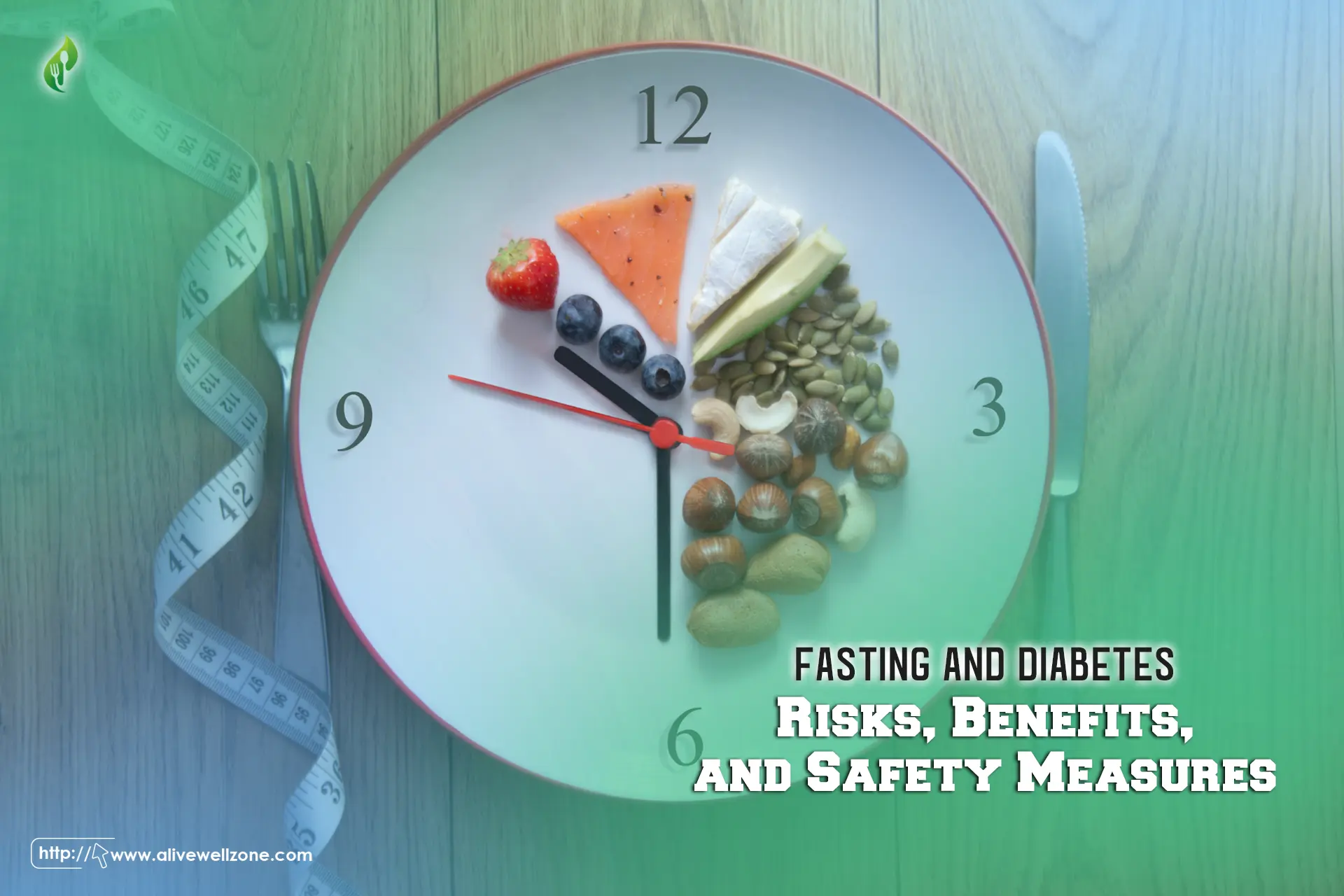
Last Updated on November 13, 2024 by Helena Akter
Do you find it tough to control your diabetes when fasting? Is keeping your blood sugar levels stable during fasting periods a hurdle for you? Remember, many others are in the same boat.
Hence, you must understand the concept of fasting and diabetes. It’s a significant move towards managing your health, especially during fasting times like Ramadan.
That’s why, we’ll explore hands-on approaches to handle diabetes while fasting. From changing your diet to controlling insulin, our goal is to provide you with the information you need to fast safely and successfully, even with diabetes.
Let’s start this journey together.
What are the Risks of Fasting and Diabetes?
If you’re living with diabetes, fasting can present certain challenges. A few key factors shape these challenges —
- The particular form of diabetes you’re dealing with
- The medication you’re using to keep your diabetes in check
- Whether your average blood sugar level (HbA1c) is currently within a safe range for you
- If you’re taking medications such as sulphonylureas and insulin that heighten the risk of hypoglycemia
- If you’re dealing with diabetes-related complications like vision impairment, nerve damage, or heart or kidney disease. Fasting could potentially worsen these issues.
For example, if you’re managing fasting and diabetes type 2 through diet and lifestyle changes alone. Or if you’re on a single diabetes medication that doesn’t increase your risk of hypoglycemia, fasting poses fewer risks if your average blood sugar level is healthy.
How to Adjust Insulin During Ramadan?
Ramadan, the holy fasting month, might require you to tweak your insulin strategy, especially if diabetes is a part of your life. The adjustment depends on several factors including your diet, existing insulin routine, and meal timings during the fast.

Basal Bolus Insulin Therapy
If you’re using basal-bolus insulin, Ramadan requires you to alter your insulin schedule. At sunset, during Iftar, take the entire dose you usually take in the morning. Take half of your usual evening dose at Sahur, the meal before dawn. If you eat dinner, move the entire dose you usually take at lunch to this meal.
For the basal part of your treatment, if you’re using NPH, take half of your dose at Sahur. If you’re using a basal analog, keep the same dose at bedtime.
Premix Insulin Therapy
In line with the South Asian Consensus Guideline, if premix insulin is part of your regimen, the timing and quantity of your doses need to change. Your usual morning dose should be taken at Iftar (the sunset meal), and half of your regular evening dose should be administered at Sahur (the pre-dawn meal).

For instance, if you normally consume 30 units while getting up and 20 units at night, you should increase it to 30 units during Iftar and 10 units during Sahur during Ramadan.
Split Insulin Therapy
If you’re on split insulin therapy, which includes short-acting and intermediate-acting insulin, you’ll need to make some adjustments. Move your entire morning short-acting dose to Iftar, and your entire lunch short-acting dose to dinner (if you have dinner).
At Sahur, keep half of your dinner short-acting dose and intermediate-acting dose.
Bi-phasic Insulin Therapy
If you’re using bi-phasic insulin, such as BILis 25, BIAsp 30, or BHI 30, along with Metformin, you’ll need to modify your routine during fasting. Take your usual breakfast dose of insulin at Iftar, and Metformin at Sahur.
Should your blood sugar levels rise too high by midday, consider adding insulin at Sahur. This should be half of your regular evening dose.
Bear in mind, that these are general suggestions. Your specific needs may vary based on your blood glucose readings. Always seek advice from your healthcare professional before altering your insulin schedule. It ensures your routine is customized to your unique needs.
What Changes to Make to Your Diet while You’re Fasting?
If you’re fasting, especially if you’re living with diabetes, it’s important to adjust your diet. Here are some simple tips for you —

- Variety in Diet: Fasting may change your eating routine, but you need to keep your meals diverse and balanced. Be mindful of your portion sizes.
- Foods with Low Glycemic Index: Before you start your fast, fill up on foods that are digested slowly. It can help keep your blood sugar levels steady.
- Mindful of Carbs: Be aware of the portion sizes of foods high in carbs. Don’t forget to add fruits, vegetables, and salads to your meals.
- Limit Sugary and Fatty Foods: When you end your fast, try to cut down on sugary and fatty foods like pastries, cakes, samosas, and puris.
- Healthy Cooking Techniques: Think about using less oil when you cook and explore healthier cooking methods like grilling, baking, or dry frying food in a non-stick pan or air fryer. Either, you can check out healthy salmon recipes where each one provides multiple nutritional benefits.
- Stay Hydrated: Keep yourself hydrated to avoid the effects of dehydration. You can drink sugar-free and decaffeinated drinks like water, diet sodas, or squashes without added sugar. If you like sweet drinks, consider using a sweetener instead of sugar.
For those dealing with fasting and diabetes type 1, these dietary adjustments can be particularly vital to effectively manage blood sugar levels during fasting.
How to Prepare for Fasting with Diabetes?
If you’re living with diabetes, you can still participate in fasting rituals like Ramadan. However, it’s vital to start preparing at least three months in advance. It allows your doctor to analyze several key factors.
- Firstly, your doctor will need to check your blood sugar control. If your HbA1c level is above 10%, or if you frequently experience low blood sugar, fasting might not be safe for you. Similarly, if your blood sugar levels often fluctuate greatly, fasting could be risky.
- Next, your doctor will assess any other health conditions you have. Some conditions, such as chronic kidney disease, liver failure, and serious heart problems like unstable angina or heart failure, can worsen with prolonged fasting.
- Your diabetes medication may also need to be adjusted. You might need a different type of medication or a change in dosage. Your doctor can advise you on the best time to take your medication while fasting.
- Your diet and meal plan may need to be altered for Ramadan, but your daily calorie intake should remain the same. It’s important to consider your personal customs and habits when making these changes.
- Lastly, be aware of the risk of dehydration and electrolyte imbalance during fasting. Your doctor can provide advice on how to prevent these issues.
What are the Symptoms of Hypoglycemia while Fasting?
If you’re fasting and have hypoglycemia, you might notice a variety of symptoms.
- You could feel dizzy and have headaches.
- Despite the chill, you might break out in a sweat.
- Your body might shake or have spasms.
- You could feel worn out and slow.
- Your vision might blur, and your heart might beat quickly and irregularly.
- You might feel hungrier than usual, and you might have trouble thinking clearly and speaking.
- You might also feel restless, anxious, or irritable.
These are all common signs of hypoglycemia during fasting.
Who is Exempt from Fasting?

If you’re considering fasting, especially with diabetes, you must first talk to your healthcare team. However, some people may not need to fast. These include —
- Kids: Generally, children who haven’t hit puberty don’t need to fast.
- Older adults: Due to health risks, seniors might be excused.
- People with health conditions: If you’re sick or dealing with a specific health issue, it’s usually best to avoid fasting.
- Individuals with learning challenges: Those facing cognitive difficulties are often exempt.
- Travelers: Fasting can be tough when you’re traveling, so it’s usually not necessary.
- Women in certain phases of life: Women who are breastfeeding, pregnant, or menstruating are typically allowed to skip fasting.
Final Words
To sum up, we’ve delved into the complex link between fasting and diabetes. Plus, we’ve you need to do thoughtful preparation, regular blood sugar checks, and necessary tweaks to diet and medication. That way you can fast can be safe if you’re a diabetic patient.
However, you must seek advice from your healthcare team before starting this journey. As we look to the future, we’re hopeful that ongoing research and progress in diabetes care will make fasting increasingly manageable for those with diabetes.
Always remember, your health is of utmost importance, so make decisions wisely.
FAQs
What is Hypoglycemia?
Hypoglycemia is a health issue that arises when your blood glucose dips below 70 mg/dL, the standard threshold. It’s often linked to fasting and is prevalent among individuals with diabetes or other blood sugar-related conditions. The absence of glucose from food and beverages can trigger this condition.
Can you fast if you have diabetes?
Yes, you can. If you’re a diabetic considering fasting, it’s vital to first talk to your healthcare team. They’ll guide you on how to keep track of your blood sugar levels while fasting. Be mindful of potential hazards like low or high blood sugar, dehydration, and stroke.
Is self-monitoring of blood glucose allowed during Ramadan?
Absolutely! If you’re diabetic and fasting during Ramadan, it’s recommended to regularly check your blood sugar levels. This practice enhances safety and helps manage your blood sugar effectively. And don’t worry, experts confirm that checking your blood sugar doesn’t break your fast.
What are the greatest risks for people with diabetes who decide to fast during Ramadan?
If you’re diabetic and choose to fast during Ramadan, be aware of the major risks. These include hypoglycemia (low blood sugar), hyperglycemia (high blood sugar), dehydration, and even stroke. You need to keep a close eye on these risks.







